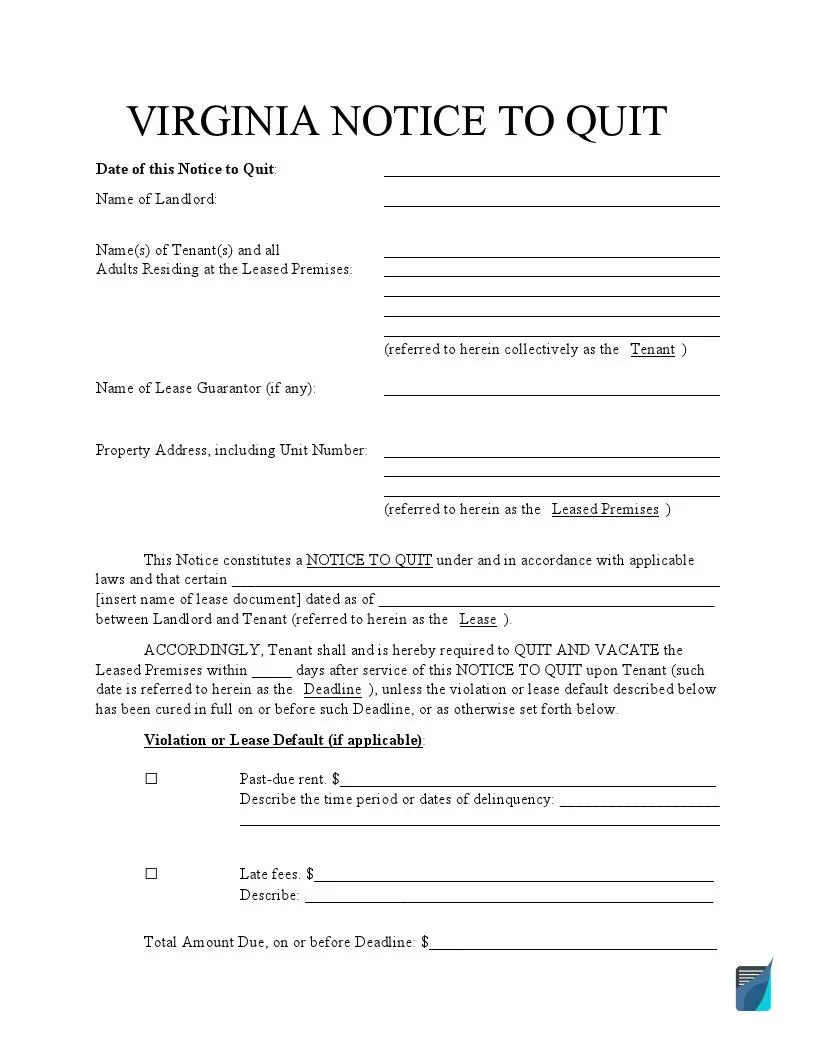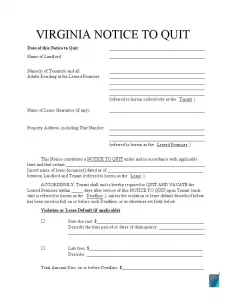Virginia Eviction Notice Forms
Eviction Notice is a legal instrument used to inform a renter before starting an eviction process. An eviction notice template is something every landlord must have to make the process of tenancy termination legit.

Build Your Document
Answer a few simple questions to make your document in minutes
Save and Print
Save progress and finish on any device, download and print anytime
Sign and Use
Your valid, lawyer-approved document is ready
Virginia Eviction Laws
In Virginia, relationships between a rental property owner and a renter are regulated by the Virginia Landlord-Tenant Act. This act lists obligatory rules and conditions that each landlord and each renter in the state of Virginia must abide by.
According to the state of Virginia eviction laws, a rented property owner cannot ask a renter to quit without any legal reasons. The reasons that will make termination of rental agreement possible are listed below:
- A renter does not pay the rent
- A renter breached one or more of the rental terms
- A renter purposely damaged the rental property
- A renter practiced illegal activity on the rental premises (including drug-related crimes)
Virginia Eviction Notice Laws Details
| Rent Grace Period | 5 days (for oral lease) |
| Notice of Non-Payment | 5 days |
| Notice of Non-Compliance | 21 days |
| State Laws | Virginia Code, Sections 55.1-1234 to 55.1-1257 |
Types of Eviction Notices Used in Virginia
- 5-Day Notice
This type of notice is used, whether as a reminder to pay the rent or as a requirement to vacate the rental premises. If the notice is ignored by the renter, the rental property owner has the right to proceed with the eviction and file a complaint to the local court.
- 30-Day Notice
The rental property owner can choose this type of notice if the renter has breached the terms of the rental agreement. The renter gets informed that they must remedy the violation or leave the rental dwelling within the period of twenty-one days. If the renter does nothing of the above, the property owner can file an eviction complaint as a 30-day-notice period expires.
- 30-Day Unconditional Quit Notice
If the violation of the rental agreement cannot be remedied (for instance, if the renter seriously damages the property on purpose), a 30-day unconditional quit notice is used. With that notice, the renter is informed that the rental dwelling must be vacated within thirty days. If the renter chooses to refuse, the property owner is free to file a complaint to the local court to forcefully remove the renter.
This notice is also used if the renter commits a violation similar to the one they have been warned about before. If this happens, the notice must include the current violation and a reference to the previous violation of the same sort.
- No notice needed
However, there are cases when the landlord does not need any type of notice to initiate the tenancy termination. Such cases include unlawful activity within the rental dwelling or any other potentially dangerous acts. These acts include any criminal drug-related activity. Under these circumstances, the landlord is free to file an eviction lawsuit with no previous notice to the renter.
No-Cause Termination of Tenancy
- Fixed-Term Tenancy
To end this type of tenancy, a landlord needs to wait until the agreement expires. When that happens, the landlord is free to ask a renter to quit with no notice unless it is stated in terms of the rental agreement.
- Month-to-month Tenancy
With a monthly-paid lease, a 30-day notice is required to inform a renter that the tenancy will be terminated at the end of a thirty-day period. If the renter refuses to leave the rental unit after the month-to-month rental agreement has expired, the property owner can file a complaint to the local court and have a sheriff or anyone older than 18 years of age serve the complaint on the renter.

Popular Local Eviction Notice Forms
Eviction Process in Virginia
Below is the four-step instruction that will get you familiar with the process of eviction as it is done in Virginia following the state’s laws.
- Informing a renter
Starting an eviction process in Virginia takes an eviction notice. The rental property owner must consider the tenancy type and the violations of the rental agreement to use them as grounds for creating an eviction notice. The notice then must be delivered to the renter. When creating a proper eviction notice, feel free to use our form-building software.
- Filing a lawsuit
This step is necessary if the renter refuses to leave the rental premises. Since according to Virginia laws, the landlord has no legal right to remove the renter himself. The landlord must file an eviction lawsuit that has to be served on the renter at least ten days before the hearing.
- Waiting for the writ of eviction
Upon winning the lawsuit, the landlord must obtain the writ of eviction within 180 days. Otherwise, the landlord will have to repeat the whole process again. The writ of eviction, in its turn, must be delivered to the renter by a sheriff.
- Removing the renter
If the renter ignores the court’s decision and does not vacate the rented property, he will be removed forcibly by a law enforcement officer.
Virginia Eviction Court Forms
- Summons and Complaints. Copies of these documents are used to inform a renter of an upcoming court hearing on the eviction lawsuit from a landlord.
- Writ of eviction. This legal document is issued if the landlord’s eviction lawsuit is satisfied and the case is won. Writ of eviction then must be delivered to a renter by a law enforcement officer as the final warning to vacate the rental property.

Consider our document builder to personalize any form found on FormsPal to your requirements. Here is a group of other common Virginia documents we offer.
